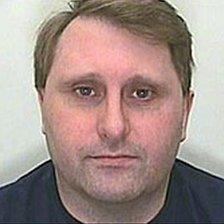Avon and Wiltshire mental health trust criticised
- Published

Timothy Crook was sentenced to an indefinite period in a secure hospital
The culture and leadership of a mental health trust has been seriously criticised in an independent review.
The review of Avon and Wiltshire Mental Health Partnership NHS Trust (AWP) was commissioned after concerns were raised about the care of two patients involved in killings in Swindon in 2007.
It concluded that the trust culture was "centralist, top down and target driven, bureaucratic and controlling".
The trust has published a plan - Fit for the Future - to address the issues.
In November last year, two independent reports found the deaths of three people who were killed by mental health patients could have been avoided.
Timothy Crook battered to death his elderly parents Bob and Elsie, and Carl James, 21, was killed by his schizophrenic friend Michael Harris.
NHS South of England then commissioned the independent review which has just been published.
The review is critical of a weak clinical voice in decision-making, inadequate medical (and wider clinical) engagement, with doctors broadly distanced from management.

Elsie and Bob Crook were killed by their son who suffered from a delusional disorder
It notes that: "There has been significant progress over the past five years in putting in place new structures, policies and processes and gaining control of a previously disparate, poorly performing organisation."
It concludes that "there is an urgent need to change the culture and leadership from one of central control to one in which all staff are positively engaged and involved in determining and delivering safe, high quality care."
Recommendations include revisiting the homicide investigation reports and considering what actions still need to be taken.
The trust's then chairman Felicity Longshaw has resigned and its chief executive Laura McMurtrie has retired since the report was completed earlier this year.

Carl James was killed by his schizophrenic friend Michael Harris
The trust's new chairman, Tony Gallagher, has begun the process of recruiting a new chief executive.
Mr Gallagher said: "There are some very important lessons here and I am determined that we will create a new, less centralised leadership model that is strongly informed by the needs of our local communities and our service commissioners.
"We will put service users and carers at the heart of everything we do. Our overarching objective will be to radically improve outcomes for service users and to improve our staff's ability to make a real difference."
- Published11 May 2012
- Published17 January 2012
- Published22 November 2011
- Published22 November 2011